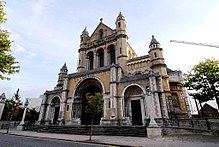St Anne's Cathedral, Belfast
| St Anne's Cathedral, Belfast | |
|---|---|
| The Cathedral Church of St. Anne, Belfast | |
 |
|
| 54°36′10″N 05°55′42″W / 54.60278°N 5.92833°WCoordinates: 54°36′10″N 05°55′42″W / 54.60278°N 5.92833°W | |
| Country | Northern Ireland |
| Denomination | Church of Ireland |
| Website | www.belfastcathedral.org |
| History | |
| Dedication | St Anne |
| Architecture | |
| Architect(s) | Sir Thomas Drew |
| Groundbreaking | 1899 |
| Completed | 1904 |
| Administration | |
| Diocese | Diocese of Connor |
| Province | Province of Armagh |
| Clergy | |
| Bishop(s) | Bishop of Connor |
| Dean | The Very Revd John Mann |
| Precentor | The Venerable S R McBride |
| Laity | |
| Director of music | David Stevens |
| Organist(s) | Ian Barber |
St Anne's Cathedral, also known as Belfast Cathedral, is a cathedral of the Church of Ireland in Donegall Street, Belfast, Northern Ireland. It is unusual in serving two separate dioceses (Connor and Down and Dromore), yet being the seat of neither (it is geographically in the Diocese of Connor), it is therefore not a cathedral in the truest sense of the word, a cathedral being a church housing the seat of a bishop. It is, however, titled as such. It is the focal point of the Cathedral Quarter, Belfast.
The first architect was Sir Thomas Drew, the foundation stone being laid on 6 September 1899 by the Countess of Shaftesbury. The old parish church of St Anne by Francis Hiorne of 1776 had continued in use, up until 31 December 1903, while the new cathedral was constructed around it; the old church was then demolished. The Good Samaritan window, to be seen in the sanctuary, is the only feature of the old church to be retained in the cathedral. Initially, only the nave of the cathedral was built, and this was consecrated on 2 June 1904.
In 1924 it was decided to build the west front of the cathedral as a memorial to the Ulstermen and women who had served and died in World War I. The foundation stone for this was laid by Governor of Northern Ireland, the Duke of Abercorn on 2 June 1925 and the completed facade, to an amended design by the architect Sir Charles Archibald Nicholson, was dedicated in June 1927.
...
Wikipedia
